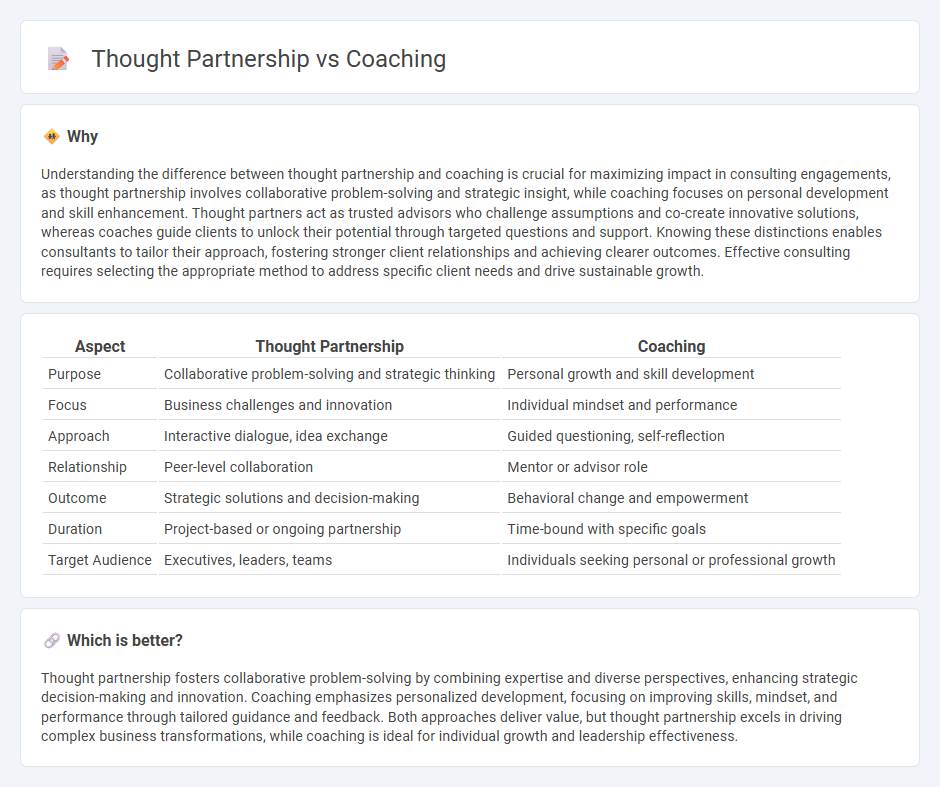
Thought partnership involves collaborative problem-solving and strategic dialogue to unlock innovative solutions, while coaching focuses on developing individual skills and self-awareness through guided questioning. Both approaches enhance professional growth, but thought partnership emphasizes shared expertise and co-creation of ideas, whereas coaching concentrates on personal development and goal achievement. Discover how integrating thought partnership and coaching can transform your leadership effectiveness.
Why it is important
Understanding the difference between thought partnership and coaching is crucial for maximizing impact in consulting engagements, as thought partnership involves collaborative problem-solving and strategic insight, while coaching focuses on personal development and skill enhancement. Thought partners act as trusted advisors who challenge assumptions and co-create innovative solutions, whereas coaches guide clients to unlock their potential through targeted questions and support. Knowing these distinctions enables consultants to tailor their approach, fostering stronger client relationships and achieving clearer outcomes. Effective consulting requires selecting the appropriate method to address specific client needs and drive sustainable growth.
Comparison Table
| Aspect | Thought Partnership | Coaching |
|---|---|---|
| Purpose | Collaborative problem-solving and strategic thinking | Personal growth and skill development |
| Focus | Business challenges and innovation | Individual mindset and performance |
| Approach | Interactive dialogue, idea exchange | Guided questioning, self-reflection |
| Relationship | Peer-level collaboration | Mentor or advisor role |
| Outcome | Strategic solutions and decision-making | Behavioral change and empowerment |
| Duration | Project-based or ongoing partnership | Time-bound with specific goals |
| Target Audience | Executives, leaders, teams | Individuals seeking personal or professional growth |
Which is better?
Thought partnership fosters collaborative problem-solving by combining expertise and diverse perspectives, enhancing strategic decision-making and innovation. Coaching emphasizes personalized development, focusing on improving skills, mindset, and performance through tailored guidance and feedback. Both approaches deliver value, but thought partnership excels in driving complex business transformations, while coaching is ideal for individual growth and leadership effectiveness.
Connection
Thought partnership and coaching are interconnected through their emphasis on collaboration and growth, where thought partners offer strategic insights while coaches guide individuals in unlocking their potential. Both approaches foster reflective dialogue that enhances decision-making and self-awareness, driving personal and organizational development. This synergy maximizes effectiveness in problem-solving, leadership development, and performance improvement within consulting engagements.
Key Terms
Guidance
Coaching emphasizes personalized guidance to unlock an individual's potential and improve performance through structured support and targeted feedback. Thought partnership involves collaborative dialogue where both parties engage in reflective thinking to generate insights and innovative solutions. Explore the distinct benefits of coaching and thought partnership to enhance your leadership and decision-making skills.
Collaboration
Coaching emphasizes personalized guidance and skill development through structured dialogue, while thought partnership centers on collaborative idea exchange and innovative problem-solving between equals. Both approaches foster growth but differ in dynamic: coaching leans on expert facilitation, thought partnership thrives on mutual insight generation. Explore how blending coaching and thought partnership can elevate your collaboration effectiveness.
Co-creation
Coaching emphasizes guiding individuals to unlock their potential through structured questioning and feedback, while thought partnership centers on collaborative ideation and co-creation of innovative solutions. Both approaches foster growth and development, but thought partnership drives shared ownership and mutual insight generation for more dynamic problem-solving. Explore how merging coaching with thought partnership can amplify co-creative outcomes in your projects.
Source and External Links
What Is Coaching? - Coaching is a developmental partnership between manager and employee that focuses on ongoing feedback, support, and direction to improve performance and achieve goals within a performance management cycle.
Coaching - Business and executive coaching is a human resource development method that supports professionals in achieving specific goals through feedback, advice, and behavioral change, often enhancing leadership and organizational effectiveness.
What is Coaching? - Coaching is about helping individuals unlock their own potential by asking the right questions and facilitating self-discovery, differing from mentoring or teaching because the coach is not necessarily an expert but a catalyst for personal insight.
 dowidth.com
dowidth.com